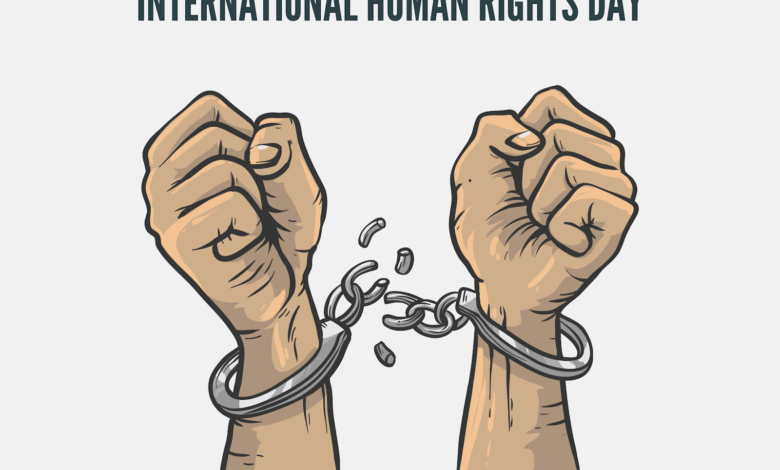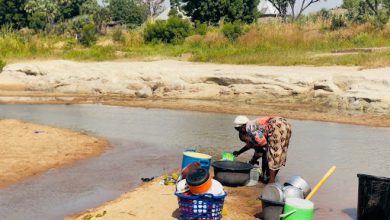Int’l Human Rights Day: A Look At The State Of Human Rights In Nigeria
Despite being a signatory to the “United Nations Treaty Against Torture and Other Cruel, Inhuman or Degrading Treatment or Punishment,” adopted in 1975, violation of human rights and fundamental freedom has become the norm in Nigeria.

On Dec. 10, 1948, representatives of different legal and cultural backgrounds from all regions of the world came together to adopt the Universal Declaration of Human Rights (UDHR), a set of universal, indivisible and inalienable rights recognising the equal dignity and worth of everyone. At the meeting, stakeholders set common values and recognised that human rights are inherent to all humans.
While this year makes it 75 years since the UDHR came into being, many Nigerians continue to suffer deprivation of their rights, especially in the hands of government and security agencies. From the Nigeria Police Force to the Nigerian Armed Forces, unlawful and arbitrary killings, forced disappearances, torture and cases of cruel treatment of citizens, and life-threatening prison conditions have become the norm.
The rising insecurity in Nigeria has also led to unlawful killings, disappearances, physical abuse, and other mistreatment of citizens by terrorist groups who subject many women and girls to gender-based violence, including forced marriages, sexual slavery, and rape, particularly in the North East, North West and South East regions of the country.
As UN Human Rights Chief, Volker Türk posits, “Now, more than ever, it is time for human rights,” it is important to review the cases of fundamental human rights abuses in Nigeria.
Unlawful killings, forced disappearances
According to a 2022 report by the International Committee of the Red Cross, there are 25,000 missing people in Nigeria, more than in any other country on the African continent. Most of these persons reportedly disappeared at the peak of the Boko Haram conflict in the North East, as the military detained without trial civilians suspected to have affiliation with the insurgents.

In a recent investigation by HumAngle/New Lines, it was discovered that soldiers were involved in summary executions, extrajudicial killings, and mass burials of civilians in Maiduguri, the capital of Borno. At least 15 sites in the state, where the military allegedly buried bodies of people killed extrajudicially, were identified. The exposed case is one of many atrocities of security operatives in Nigeria.
In 2020, two incidents triggered nationwide protests, which culminated in what is nw referred to as the Lekki Massacre. The two incidents involved the killing of a young Nigerian in front of Wetland Hotel in Delta State by the police and the killing of a 20-year-old musician, Daniel Chibuike, in Rivers State in 2020. A year after the military opened fire on harmless protesters, the panel of inquiry set up to investigate the soldiers’ actions says there were no fewer than 48 casualties. It confirmed the death of 11 people, and four people are still missing to date.
In addition, state-owned security operatives set up to address security challenges in South East, South West and North East have, in the last few years, been enmeshed in extrajudicial killings, and there has been no news of any sanction for perpetrators. All of these contradict Section 33 (1) of the 1999 Constitution, which guarantees the right to life for all Nigerians.
Illegal detention, torture
Though Nigeria ratified the International Covenant on Civil and Political Rights (ICCPR) in 1993, the Convention against Torture (CAT) in 2001, and the Optional Protocol to the Convention against Torture (OPCAT) in 2009, none of these have been integrated into the local laws. However, Section 34 of the 1999 Constitution provides that “every individual is entitled to respect for the dignity of his person.”
As of October, when the third anniversary of the #LekkiMassacre was held in Nigeria, Amnesty International, an international non-governmental human rights organisation, reported that there are still 15 protesters detained without trial in prisons since 2020. One of those illegally detained by the police, Rasheed Balogun, who was arrested in 2021, only regained freedom after HumAngle’s report on how he was tortured and forced to confess to being a cultist and armed robber.
“My days in detention made me realise that there are many people in detention suffering for an offence they never committed. It was a bitter experience for me. The inspector in charge of my case placed a locally-made gun in front of me and forced me to say I was using the gun for robbery. He used an Android phone to do the video recording a day before my arraignment,” he narrated in an earlier report by HumAngle.

Just last week, HumAngle published a report on how a cleaner and two guards who worked for FHI 360 and Halogen Security were in detention for over four months after terrorists kidnapped three employees of the organisation in Borno. The arrested trio were accused of aiding the abduction. Though they have been released, their families are demanding justice for the gross violation of their rights.
For most people illegally detained, one thing is common, which is the act of torture. They allege torture involving the tying of arms and legs behind the body, spraying of tear gas in the eyes, sexual violence against female detainees, use of pliers or electric shocks on the penis, and denial of food and water.
Miscarriage of justice
In Nigeria, eyewitness misidentification, faulty forensic analysis, false confessions by vulnerable suspects, perjury and lies told by witnesses, and misconduct by police, prosecutors or judges usually lead to miscarriage of justice. For instance, Abass Owonikoko spent over two decades in prison after he had a fight with a masquerade in Ibadan on Oct. 23, 1993. After two days in police custody, he was accused of robbery and spent a year in detention before his first court appearance in 1994.
“I witnessed the death of over 120 people who were tortured by police and prison officials,” he told our reporter. Owonikoko also said he lost his wife and two children in an accident when they were coming to visit him in prison in March 2016.
“I went to pray on April 4, 2020, when I was told that they reviewed my papers and I was among those to be released to decongest the prison. I got to my house that same day, but it was already dilapidated. I saw my parents’ grave sites. My wife is no more and so are my children too,” he recalled.
Like Owonikoko, there are hundreds of people with horrible experiences in prison, a development causing congestion in prison.
“We have a case of somebody who was charged and convicted for murder by a high court in Ogun State, and when the matter got to the court of appeal, the police said it was attempted murder. This implies that the conviction was illegal. We have raised this issue before the government of the state and hope we get justice for him,” said Abiodun Bamiteko, a spokesperson for the Centre for Justice Mercy and Reconciliation, a non-governmental organisation that supports ex-prisoners.
New gov’t, same issues
While it’s been six months since Bola Tinubu took over from Muhammadu Buhari as Nigeria’s President, he has failed to uphold human rights values, says Amnesty International. The organisation, in a document titled: “Nigeria: Human Rights Agenda 2023”, explained that the new government policies do not address rampant human rights violations across the country.
“We implore the government to make human rights protection its priority by ensuring that every Nigerian’s rights are protected and that perpetrators of rights breaches do not go unpunished,” the rights organisation said.
It also urged the government to carry out a thorough investigation into the counterinsurgency operations executed by the Nigerian military in the North East.
Support Our Journalism
There are millions of ordinary people affected by conflict in Africa whose stories are missing in the mainstream media. HumAngle is determined to tell those challenging and under-reported stories, hoping that the people impacted by these conflicts will find the safety and security they deserve.
To ensure that we continue to provide public service coverage, we have a small favour to ask you. We want you to be part of our journalistic endeavour by contributing a token to us.
Your donation will further promote a robust, free, and independent media.
Donate HereStay Closer To The Stories That Matter




